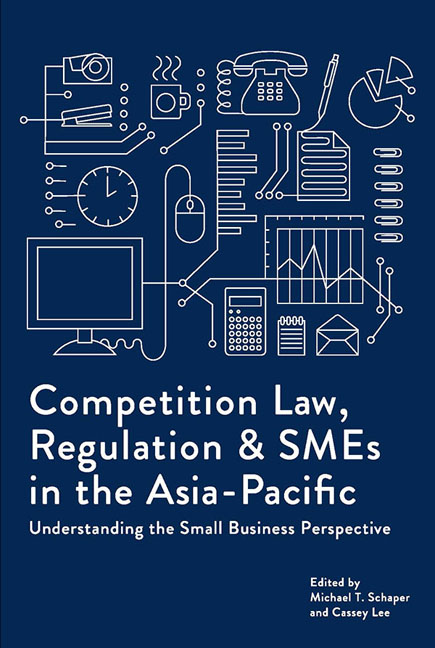 Competition Law, Regulation and SMEs in the Asia-Pacific
Competition Law, Regulation and SMEs in the Asia-Pacific Book contents
- Frontmatter
- Contents
- Foreword
- About the Contributors
- 1 Introduction: Making the Invisible SME More Visible in Competition Policy and Law
- Section 1 Theories And Basic Concepts
- Section 2 Smes And Competition Law
- Section 3 Country Studies
- 12 Competition Law, Regulation, and Trade: Implications for Productivity and Innovation in Singaporean Manufacturing SMEs
- 13 SME Law and Abuse of a Superior Bargaining Position in Japan
- 14 Competition Law, Policy, and Smes in South Korea
- 15 Competition Law Implementation and Smes: Singapore's Experience
- 16 Competition Law and SMEs in Indonesia
- 17 Smes and Malaysia's New Competition Law: Experiences to Date
- 18 Competition Policy and Sme Development in Vietnam
- 19 China's Anti-Monopoly Law and the Sme Sector
- 20 A New Competition Agency Learns to Deal with Smes: The Case of the Hong Kong Competition Commission
- 21 The Regulation of Television Programme Production Contracts under Japan's Subcontract Act
- 22 Small Enterprises and Competition Policy in Pacific Island Countries
- Index
17 - Smes and Malaysia's New Competition Law: Experiences to Date
from Section 3 - Country Studies
Published online by Cambridge University Press: 05 August 2017
- Frontmatter
- Contents
- Foreword
- About the Contributors
- 1 Introduction: Making the Invisible SME More Visible in Competition Policy and Law
- Section 1 Theories And Basic Concepts
- Section 2 Smes And Competition Law
- Section 3 Country Studies
- 12 Competition Law, Regulation, and Trade: Implications for Productivity and Innovation in Singaporean Manufacturing SMEs
- 13 SME Law and Abuse of a Superior Bargaining Position in Japan
- 14 Competition Law, Policy, and Smes in South Korea
- 15 Competition Law Implementation and Smes: Singapore's Experience
- 16 Competition Law and SMEs in Indonesia
- 17 Smes and Malaysia's New Competition Law: Experiences to Date
- 18 Competition Policy and Sme Development in Vietnam
- 19 China's Anti-Monopoly Law and the Sme Sector
- 20 A New Competition Agency Learns to Deal with Smes: The Case of the Hong Kong Competition Commission
- 21 The Regulation of Television Programme Production Contracts under Japan's Subcontract Act
- 22 Small Enterprises and Competition Policy in Pacific Island Countries
- Index
Summary
On 1 January 2012, the Competition Act 2010 came into operation in Malaysia. The Malaysia Competition Commission (MyCC) has faced significant challenges educating Malaysia's small and medium-sized enterprises (SMEs) on the need to comply with this new law.
Despite petitioning to the contrary, the Malaysian Government did not exempt SMEs from application of the law. However, the MyCC has since adopted a helpful position to the small business sector in its guidelines. Agreements, other than serious cartels, entered into by businesses with low market shares are considered to not affect competition so the Act does not apply. It is likely that many agreements entered into by SMEs will benefit from these rules.
Most of the cases investigated by the MyCC to date have involved SMEs. In many cases, trade associations have facilitated the illegal arrangements. Notwithstanding the significant advocacy efforts of the MyCC, there is still a worryingly low awareness and understanding of the law. The MyCC has experienced substantial difficulties in disseminating information to the widespread, multilingual SME community. Even those businesses aware of the law have been slow to undertake compliance. Trade associations and business groups have a key role to play in helping SMEs to understand and comply with the law.
This chapter briefly explains the early policy considerations, examines the cases decided to date, and the advocacy work undertaken by the MyCC, and finally considers what more needs to be done to improve SMEs’ understanding of Malaysia's competition law.
Introduction
As part of its commitment to become a self-sufficient industrialized nation by the year 2020 (Vision 2020), Malaysia has recently adopted a competition law regime. The Competition Act (CA) was passed by the Federal Parliament in April 2010, and came into force on 1 January 2012. Being new is not all bad — there is a plethora of case law and experience available from all around the world from which the Malaysia Competition Commission (MyCC) can learn. However, there are also significant challenges for a new, inexperienced competition authority to meet the expectations of the business and government communities in enforcing the new legislation.
The MyCC is an independent statutory body created by the Competition Commission Act 2010 with responsibility for enforcing the Act. Its main role is to protect the competitive process for the benefit of consumers and businesses.
- Type
- Chapter
- Information
- Competition Law, Regulation and SMEs in the Asia-PacificUnderstanding the Small Business Perspective, pp. 292 - 308Publisher: ISEAS–Yusof Ishak InstitutePrint publication year: 2016
